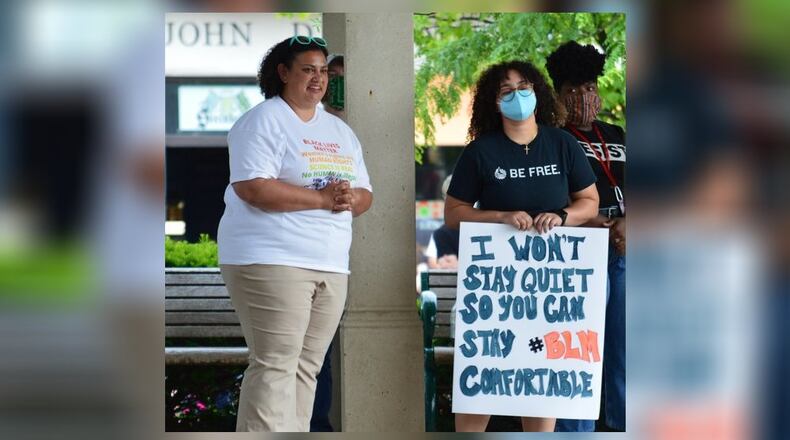TRENDING STORY: UPDATE: 2 teens arrested in deadly Liberty Twp. shooting, third suspect sought
Oxford held a protest June 4 that attracted several hundred participants and a second demonstration Monday night that drew more than 1,000 protesters, the largest rally the last few weeks in Butler County, where protests have been in Hamilton, Middletown, Fairfield and West Chester.
The Oxford crowds come while most of Miami’s students are away from the city.
Meade, who is white and has black children and grandchildren, said the crowd was very diverse in age and ethnicity and included hundreds of white residents. That representation from the white community, he said, showed “that something is wrong.”
PHOTOS: Protests throughout Butler County show pain, support, anger
Oxford has about 23,000 residents, according to the most recent U.S. census, and of those, 19,527, or 84.5 percent, are white and 1,039, or 4.5 percent, are black.
He said many Oxford residents graduated from Miami and their professors “spurred them to stay engaged” after college.
“That’s the nature of Oxford citizens,” he said. “People care about their neighbors. That makes me incredibly proud and moved.”
Tricia Hillman, organizer of the evening’s program, said Oxford “is a special community.”
For the protests around the world to be effective and change how blacks are treated by police, Meade said people need to be willing to listen and “step out of your comfort zone” by imagining what life is like for people from different backgrounds.
At Monday’s demonstration, Meade said he attended an NAACP meeting in 2014 listening to stories of young black men who recounted unpleasant experiences that occurred because they were black.
“They told stories so dissimilar to my story,” he said. “I talked to middle-age neighbors in Oxford whose stories were dissimilar from my story.”
PHOTOS: Prayer vigil held at Bailey Square in Hamilton
Those stories, he said, led him and others to press for formation of a police oversight group from which discussions came the creation of the Police Community Relations and Review Commission.
He applauded the efforts of Oxford police Chief John Jones toward communication and transparency but said the community needs to be vigilant.
“You coming here tonight is awesome, but what are you going to do next?” he asked the crowd. “We need systemic change. For that, we need you.”
Fran Jackson, president of the Oxford NAACP, said these are difficult times in the country.
“We are in a crisis, a racial crisis and a COVID-19 crisis,” she said, calling Floyd’s death “a modern-day lynching.”
Jackson cited a list of police policy reforms suggested by Derrick Johnson, the national president of the NAACP.
Among those reforms:
• Federal legislation on use of force
• Banning the use of knee holds and choke holds as acceptable practice
• Use of state open records laws to assure police actions are not hidden
“We need all members of the community to be on board,” she said. “All of you can make a difference, let your feelings be heard at the ballot box.”
Chief Jones referred to his recent Facebook post outlining how upset he was at the video of Floyd’s death. That video reflects on all who wear a badge, he said.
“I’m ashamed of that,” he said. “I ask you to not judge the officers you see here by what the officer did in Minneapolis. Every officer I have talked to abhors what happened. We have to do more training and recruit more minorities into the department.”
Regarding race, Miami President Greg Crawford said the university must engage in honest and open dialogue.
“Our social and legal system has failed the black community again and again,” he said. “We must call out white privilege. We must call out racism and bigotry.”

